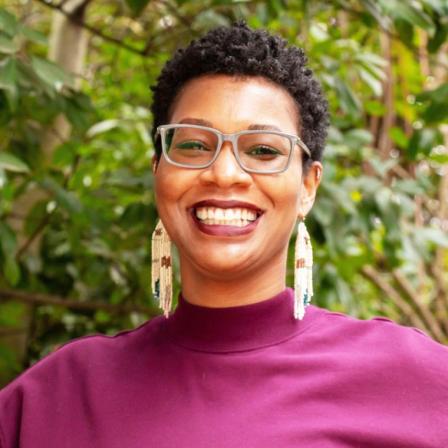

(Former) Presidential Associate Professor of Historic Preservation

Amber N. Wiley served as the inaugural Matt and Erika Nord Director of the Center for the Preservation of Civil Rights Sites (CPCRS) from 2023 - 2024. Dr. Wiley's research interests center on the social aspects of design and how it affects urban communities – architecture as a literal and figural structure of power. She focuses on the ways local and national bodies have made the claim for the dominating narrative and collective memory of cities and examines how preservation and public history contribute to the creation and maintenance of the identity and sense of place of a city. Her publications cover African American and African diasporic cultural heritage, urbanism in New Orleans, school design, urban renewal, and preservation. Her current book project is entitled Model Schools in the Model City: Race, Planning, and Education in the Nation’s Capital.
She is a co-founding member of the DC Legacy Project: Barry Farm-Hillsdale steering committee, which seeks to ensure the permanent preservation of five landmarked buildings at Barry Farm Dwellings and their use as a public community space in Washington, DC. She has completed interpretation, research, and visioning for the Association for the Study of African American Life and History, the DC History Center, National Building Museum, the National Trust for Historic Preservation, Monument Lab, and the Society of Architectural Historians. Wiley curated an exhibition with students entitled Collective Yearning: Black Women Artists from the Zimmerli Art Museum, at the Mary H. Dana Women Artist Series and Zimmerli Art Museum, which was the first time Rutgers University had conducted a comprehensive and methodical review of its holdings of art by Black women artists.
Wiley’s activism and scholarship have been honored by the Association of Collegiate Schools of Architecture, the DC Preservation League, and the Vernacular Architecture Forum. Her work has been supported by the American Educational Research Association, Artstor, Dumbarton Oaks, the Mellon Foundation, the Society of Architectural Historians, and the SRI Foundation. She has served on the National Park System Advisory Board Landmarks Committee, and on the boards of the Vernacular Architecture Forum, Latrobe Chapter of the Society of Architectural Historians, and the Yale Black Alumni Association.
She received her Ph.D. in American Studies from George Washington University. Wiley also holds a Master's in Architectural History and Certificate in Historic Preservation from the University of Virginia School of Architecture, and a B.A. in Architecture from Yale University. She is an Oklahoma City native with roots in Oklahoma, Washington, DC, Arkansas, and North Carolina.
Book
Model Schools in the Model City: Race, Planning, and Education in the Nation’s Capital (Under Advanced Contract, University of Pittsburgh Press, Culture, Politics, and the Built Environment Series)
Collective Yearning: Black Women Artists from the Zimmerli Art Museum (In Progress)
Articles
“African American Architecture,” Grove Dictionary of Art (New York: Grove Art/Oxford Art Online, Forthcoming)
“Updating the Woodson Home National Historic Landmark Nomination,” Journal of African American History 108 n. 1 (Forthcoming, Winter 2023)
“Carlos Manuel Rosario,” Washington History 30 no. 1 (Spring 2018): 48-49
“The Dunbar High School Dilemma: Architecture, Power, and African American Cultural Heritage,” Buildings & Landscapes 20 no. 1 (Spring 2013): 95-128
Chapters in Books
“Firmitas, Utilitas, Profectus: The Architecture of Exploitation in Ghana,” Architectural Guide: Sub-Saharan Africa. eds. Philipp Meuser and Adil Dalbai (Berlin: DOM Publishers, 2021): 276-283
“The Dunbar High School Dilemma: Architecture, Power, and African American Cultural Heritage,” Giving Preservation a History: Histories of Historic Preservation in the United States, Second Edition, eds. Max Page and Randall Mason (London, New York, NY: Routledge, 2019): 249-301
“A Model School for a Model City: Shaw Junior High School as a Monument to Planning Reform,” Designing Schools: Space, Place and Pedagogy, eds. Julie Willis and Kate Darian-Smith (London, New York, NY: Routledge, 2017): 158-174
“A Modern-Day WPA,” Bending the Future: Fifty Ideas for the Next Fifty Years of Historic Preservation in the United States, eds. Max Page and Marla R. Miller (Amherst: University of Massachusetts Press, 2016): 261-264
“Geography, Planning, and Performing Mobility in New Orleans,” Walking in Cities: Quotidian Mobility as Urban Theory, Method, and Practice, eds. Timothy Shortell and Evrick Brown (Philadelphia: Temple University Press, 2016): 177-196
Non-Refereed Essays
“East Jersey Old Town Village, Piscataway, NJ,” Revolution Research: Revolution NJ Artistic Research Residency, Monument Lab (Summer 2021): 29-32.
“Amber N. Wiley on Teaching with the Tang Collection,” Accelerate: Access and Inclusion at the Tang Teaching Museum, eds. Ian Berry and Rebecca McNamara (Saratoga Springs, NY: Frances Young Tang Teaching Museum and Art Gallery, 2017): 8-9
“Carrie Mae Weems, When and Where I Enter the British Museum,” Accelerate: Access and Inclusion at the Tang Teaching Museum, eds. Ian Berry and Rebecca McNamara (Saratoga Springs, NY: Frances Young Tang Teaching Museum and Art Gallery, 2017): 10-13
“Schools and Prisons,” Black Lives Matter Dossier, eds. Meredith TenHoor and Jonathan Massey. Aggregate Architectural History Collaborative 2 (March 2015)
"An American in Saigon," Architect Magazine (June 8, 2015)
“Integrating Architecture into Digital and Public Humanities: Sites and Sounds + MediaNOLA,” Journal of Digital Humanities 2 no. 2 (Spring 2013)